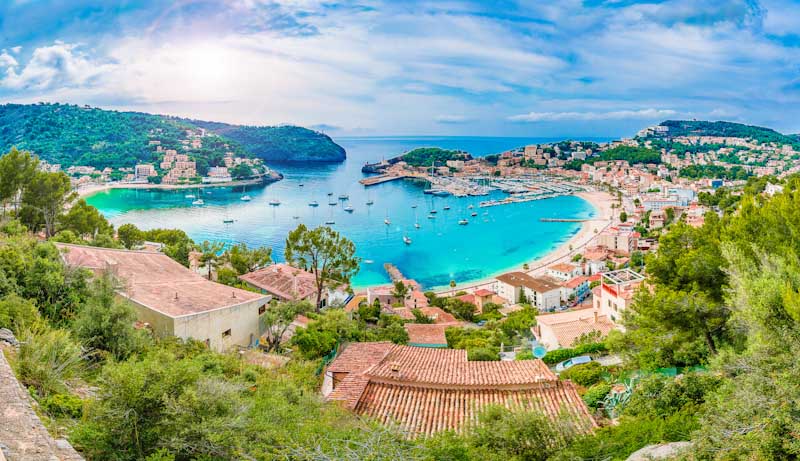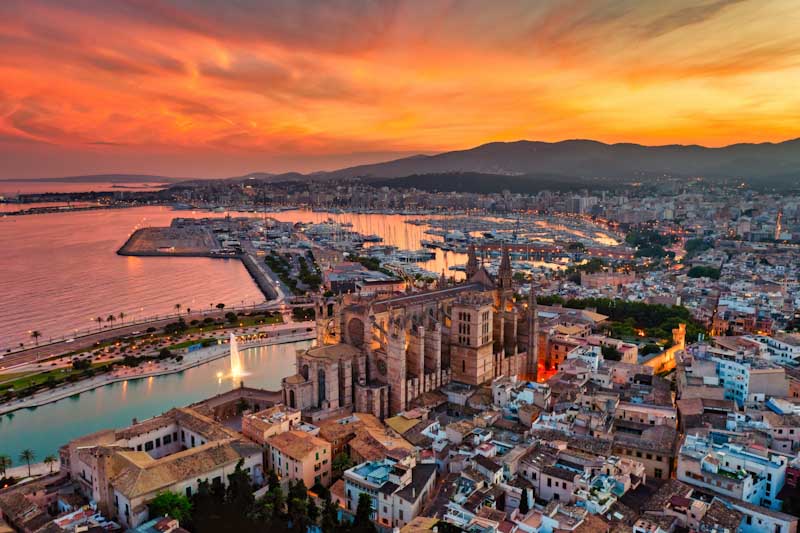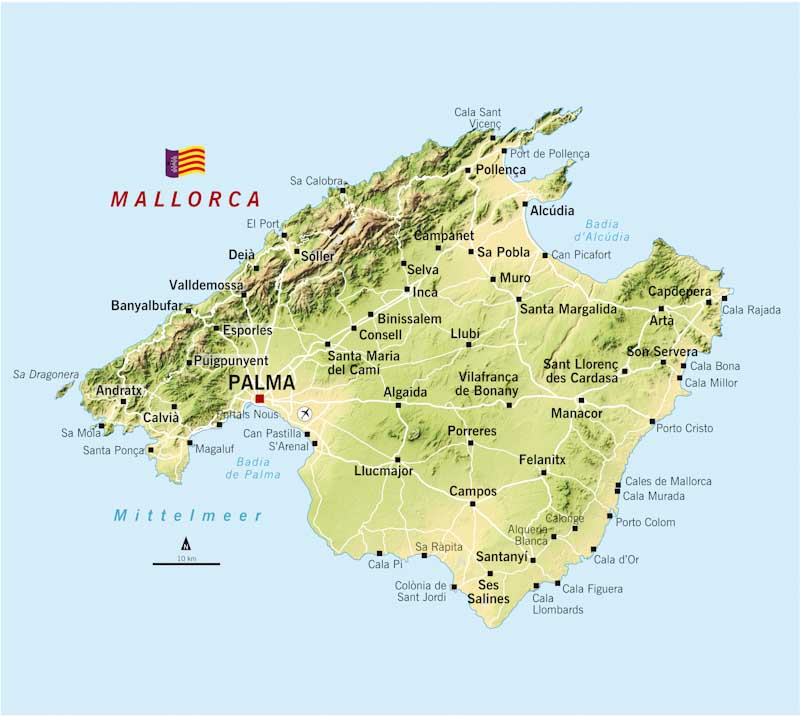In this European road trips guide, we explain the best route to get to the largest Balearic Island from the UK, as well as some helpful tips once you get there.
Driving to Mallorca from the UK
Driving from the UK to Mallorca is a scenic and adventurous journey that makes use of multiple roads and ferries.
Start by driving to France via the LeShuttle (Eurotunnel) or getting a ferry from Dover to Calais.
From there, take the A26 and A10 motorways south through France, often incurring French toll roads, so make sure you have the right information.
Continue via the A63 to the Spanish border, then join Spain’s AP-8 and AP-7 motorways heading toward Valencia.
These Spanish motorways also have tolls.
In Valencia or Barcelona, board a ferry to Palma de Mallorca.
The two best options are either Baleria or Trasmed, which offer overnight sailings with vehicle transport.
The ferry journeys take between seven to nine hours.
Before setting off, ensure you have the correct documents, car insurance, and European breakdown cover.
Here is the best route to take from London to Mallorca:
Renting a car
Renting a car in Mallorca is generally easy for Brits who want to explore the island.
This is because a UK driving licence is accepted and English is widely spoken at rental desks.
Major car rental companies like Europcar, Hertz, Sixt, Avis, as well as local firms have hubs around the island. There is a large depot near the Mallorca Airport.
However, booking online in advance is recommended for the best rates and availability. If you rent in France, mainland Spain, or anywhere else on the continent – make sure that you know if you can drive rental cars between European countries before booking.
- Speed limits in Spain – your complete guide
- Driving from the UK to Spain – what is the best route to take?
- Motorways and tolls in Spain – all you need to know


Instant cover available
• 24/7 rescue at the roadside
• Help to get home if your vehicle can't be fixed
• 5 star Defaqto rated cover

What do I need to drive in Mallorca?
To drive in Mallorca, British travellers only need a full, valid UK driving licence.
However, only photocard licences are accepted, so if you use an older paper licence it won’t be of any use.
Also, it is important to carry your passport with you, along with any car rental agreement and proof of insurance.
You should also have a copy of your European breakdown cover agreement.
If driving your own car, you’ll need a V5C logbook and a UK sticker.
Before setting off, make sure that you have your European driving kit on board with you.
Driving in Mallorca
The roads in Mallorca are generally well-maintained with few potholes, especially on main roads and motorways, as well as the routes between major towns.
However, many rural and mountain roads are narrow, winding, and can be challenging for larger vehicles.
Many locals tend to ride on scooters on these types of roads, creating a further potential hazard for cars.
Driving requires caution, especially around sharp bends and when encountering cyclists, who are common across the island.
There are several dirt tracks with loose stones underneath, so keep your speed low and keep an eye out for any obstacles.
Popular attractions
Mallorca offers a mix of natural beauty, cultural heritage and seaside charm.
Here's a top 10 list of attractions and must-visit spots across the island:
- La Seu (Palma Cathedral)
- Bellver Castle
- Royal Palace of La Almudaina
- Pollentia
- Santuari de Lluc
- Serra de Tramuntana
- Cap de Formentor
- Coves del Drach
- Albufera Natural Park – Wetland reserve perfect for birdwatching.
- Palma de Mallorca

Speed limits
Speed limits in Mallorca are similar to those in mainland Spain.
In urban areas, the limit is typically 30–50 km/h (18-31mph), while some rural roads allow up to 90 km/h (56mph).
On motorways, the limit is up to 120 km/h (74mph).
Drivers should be aware that there are speed cameras on most roads, and fines can be heavy.
This is why it is important to always watch for Spanish road signs, especially in villages and mountain areas where limits may drop suddenly due to narrow, winding, and challenging roads.
Road rules
There are several other laws that drivers in Mallorca need to be aware of. These include rules around seatbelts, which are mandatory, but anyone under 135cm tall must use a child seat.
Mobile phones are only allowed to be used if they are hands-free, for example connected via Bluetooth.
The island has multiple tunnels, and drivers need to use their headlights every time they enter one.
Parking
Parking rules vary across the island, with clear signage indicating if there are any restrictions in place.
Blue zones require a paid parking ticket for limited durations, while white zones allow free parking.
However, yellow lines indicate no parking or stopping.
Like mainland Spain, disabled parking spaces are reserved and strictly enforced by the local government.
Tolls
The Spanish island of Majorca has no toll roads, unlike the mainland.
Alcohol limits
The drink driving limits in Spain and Mallorca are the same. This means that the legal blood alcohol concentration (BAC), is 0.5 grams per litre in the blood stream, or 0.25 milligrams per litre of exhaled air.
Fines start from €500 and increase rapidly depending on the BAC levels.
Although it isn’t confirmed yet, the Spanish government is planning on reducing the alcohol limits for drivers.
- How to pack the car for a European road trip
- What is a vignette and where do they apply?
- Spanish road signs
Map of Mallorca
Here is a map of the Spanish island of Mallorca:

What to do in case of an emergency or breakdown?
Planning a road trip to Mallorca? Don’t leave without RAC European Breakdown Cover.
With 24/7 English-speaking assistance, roadside repairs, and onward travel support, you’ll enjoy peace of mind across the island.
Whether it’s a flat battery in Palma or a breakdown in the Tramuntana mountains, RAC keeps your journey stress-free and your adventure on track.

Instant cover available
• 24/7 rescue at the roadside
• Help to get home if your vehicle can't be fixed
• 5 star Defaqto rated cover











